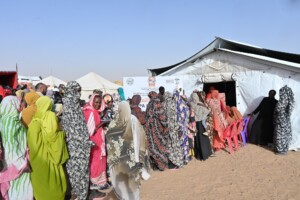Central Bank of Sudan prints new 100-Pound note
The Central Bank of Sudan (CBoS) has started printing a new denomination of currency. The initiative is aimed at solving the current liquidity crisis in the country, however critics question the wisdom of the move.
 Stacks of 50-Pound notes (File photo)
Stacks of 50-Pound notes (File photo)
The Central Bank of Sudan (CBoS) has started printing a new denomination of currency. The initiative is aimed at solving the current liquidity crisis in the country, however critics question the wisdom of the move.
According to the official Sudan News Agency (SUNA), informed sources at the CBoS say that the 100-Pound denomination is now being printed. The CBoS source says a campaign will be organised to introduce the new denomination and its security features before it is put into circulation.
“The printing of the new currency denomination has positive effects in solving the problem of the cash shortage at the moment, but it needs close follow-up by the CBoS to the position of deposits and withdrawal of the amounts exceeding the need of the economy.”
The SUNA source called for establishment of a gold fund that collects its resources from the public for the purchase of gold from miners and companies and then to be sold to central banks or exporters. Banks must be allowed to employ a maximum of five per cent of its financing portfolio to buy gold as hedging, considering that as a safe option. It will allow the central bank to exit from the trap of direct injection of liquidity and the subsequent effects of double inflation.
The Governor of the Central Bank Dr Mohamed Kheir El Zubeir said in previous statements that there were expected treatments for the problems and challenges facing the banking system, by studying the composition of the currency denominations, which commensurate with the size of growth rates of economic activity.
‘Economically stupid’
However, journalist and economic analyst Kamal Karrar has described the decision as “an economically stupid idea with the hope to return the cash mass to be circulated again to the banks and the banking system”.
In an interview with Radio Dabanga, he said: “The new measure will compel the citizens to hand their money to the banks, but because of corruption and bribery, the money will come out again”.
He added: “The optimal economic solution is for the government and banks to raise interest rates so as to encourage the public to re-deposit their money into the banks.
Cash shortage
Sudan has suffered from an acute liquidity crisis for the last few months. The CBoS had ordered commercial banks only to issue small amounts of cash, so many people who need ready cash, such as traders, bus owners and farmers, keep their cash at home.
The shortage led to long queues at banks ahead of Eid El Adha in August. Speaking to Radio Dabanga earlier this month, economist Dr Sidgi Kaballo attributed the liquidity crisis in banks to poor management pursued by the banking system. “The first reason is the failure of banks to maintain liquid assets at a certain rate and the second reason is the lack of confidence in the banking system which prompts customers not to save their money in banks,” he said.











 and then
and then